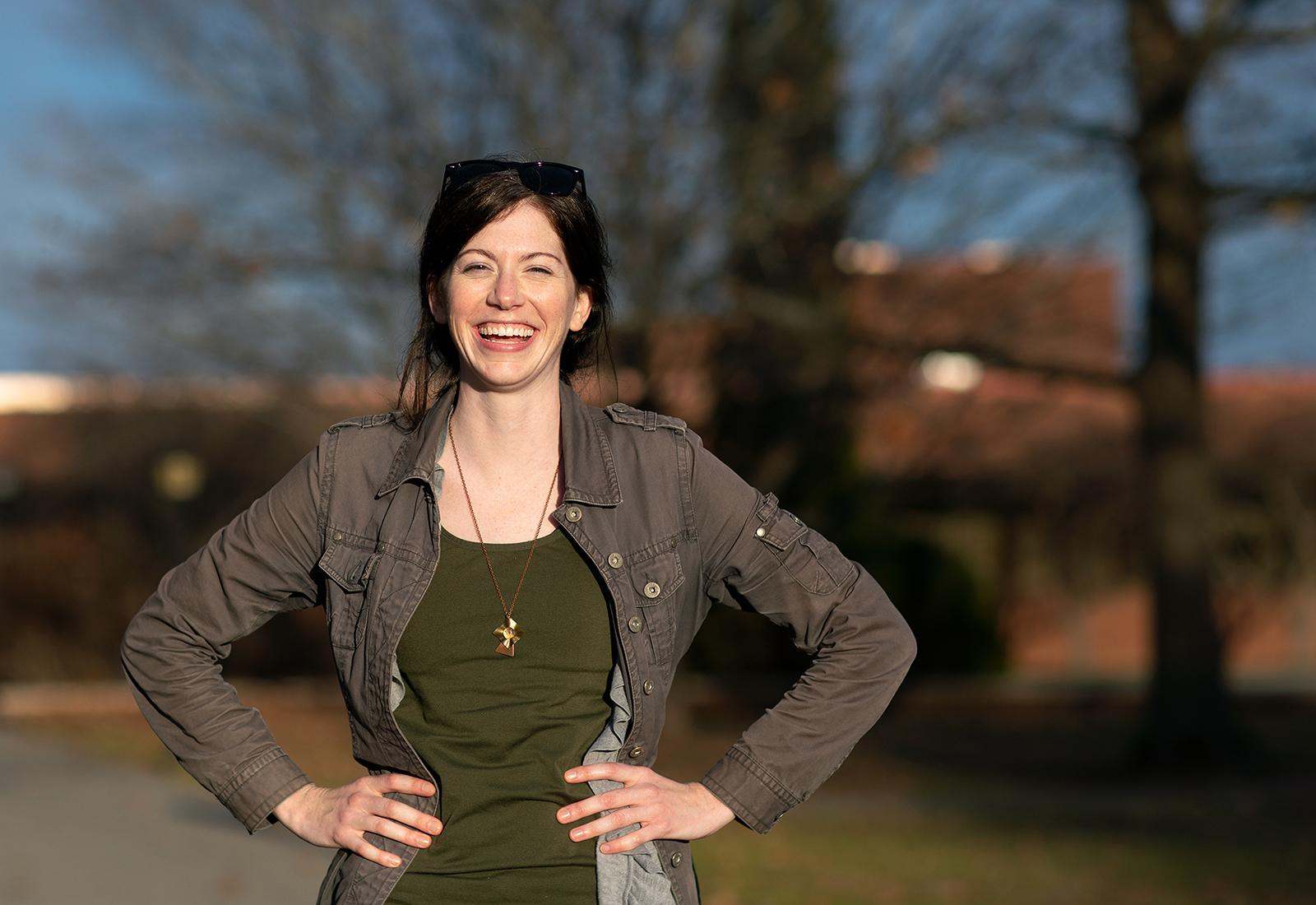SUNY Potsdam Bioarchaeologist Dr. Kathryn Grow Allen Wants to Inspire Interest in STEM Fields

SUNY PRODiG Fellow Dr. Kathryn Grow Allen brings to SUNY Potsdam a wide range of knowledge about forensic anthropology and other related fields in hopes of inspiring other women to pursue STEM fields.
Dr. Kathryn Grow Allen came to the North Country and SUNY Potsdam with the purpose of inspiring other women to pursue their interest in the STEM fields. A visiting instructor of anthropology, a SUNY PRODiG fellow and the mother of two young children, she shows the way through lived experience.
For many mothers who are trying to figure out how to get a degree in higher education, a single hopeful interaction with someone who has been there can make all the difference, Allen said. She and her family recently moved four times in three years. She defended her National Science Foundation-funded dissertation while seven months pregnant. Then she flew to Chapel Hill, N.C., for a week of lab work with ancient dental enamel, barely able to keep anything down. She was in Croatia collecting data for her dissertation during her second trimester. And in her third, she presented at two different conferences. She was, during this time, exhausted and stretched to her limit.
“You need a whole community of people who support and encourage you to keep at it and keep working,” Allen said.
As she made her way toward her 2017 Ph.D. in anthropology from the University at Buffalo, Allen sought out and talked to other professionals about how they were juggling career ambitions with family. She felt at times that it was not a given she would be able to attain her own goals.
Yet she prevailed. Under the new SUNY PRODiG Fellowship (Promoting Recruitment, Opportunity, Diversity, Inclusion and Growth) designed to increase the diversity of faculty and better represent women in STEM fields across the System, SUNY Potsdam has her for two years. Allen said she feels fortunate to be positioned within a field that does not have a single aspect she can’t love. She is leading classes in Introduction to Anthropology, Applied Anthropology, and Humans, Disease and Death. Her background spans a wide spectrum, from human origins to forensic anthropology and mummies.
“The whole discipline is fascinating,” she said. “Human cultures, archaeology, endangered languages, divergence and evolution of the human species. The entire field is about figuring out what it means to be human.”
Allen’s main research took her into the museums of southeastern Europe, where she analyzed human remains and tried to settle an old question of whether the Muslims of the Ottoman period in 1500 and 1600 converted to Islam from within or migrated into the region. Using strontium isotope analysis of dental enamel and skeletal characteristics that pointed to genetic relationships, she concluded that both versions of history are partly true.
It’s the kind of detective work that makes the fields of bioarchaeology and forensic anthropology appealing to a growing number of students made familiar with popularized versions of this work through shows like “CSI: Crime Scene Investigation” and “Bones.” In that vein, Allen, originally from Rochester, also consults for the Erie County Medical Examiner in Buffalo, N.Y., where her work puts her in contact with criminal case work she is not able to discuss in specific terms. In her Humans, Disease and Death class, students are working through an exercise to identify remains from a mass disaster simulation.
These real-world scenarios strike a particular chord.
“People are curious about death, and what it meant in the past and today,” Allen said. “The identification of the dead is something that is valued across cultures.”
Allen is waiting for funding and a lucky piece or two to fall into place so she can study the female and child mummies of Greenland’s Indigenous Thule people, a hunting culture steeped in mystery and caught in climate change a half millennium ago. A colleague on the project has convinced a local hospital to allow the use of its CT scanner on the mummies in a non-destructive examination that could yield a bounty of data.
“We don’t know why they died and why they are all buried together,” Allen says. “These women are very important to Indigenous Greenland’s sense of identity and I think it is important that I am working closely with local archaeologists and the Indigenous community on this.”
Allen’s other goal, besides connecting the people of Greenland to their Indigenous history, is to video blog about the project so her students in Potsdam can keep track remotely.
If just one woman is inspired to follow her steps, she’ll mark the job well done.
The mission of SUNY Potsdam’s Department of Anthropology is to provide students with knowledge of the five fields of anthropology and to give them practical experience in communities so that they can approach the world professionally and anthropologically. The College’s archaeological studies program offers students a chance to gain hands-on field experience working alongside experienced faculty as undergraduates. Past field school projects have included work in the North Country and the Adirondacks, and as far away as South Africa. To learn more, visit https://www.potsdam.edu/academics/AAS/Anthro.
About SUNY Potsdam:
Founded in 1816, The State University of New York at Potsdam is one of America’s first 50 colleges—and the oldest institution within SUNY. Now in its third century, SUNY Potsdam is distinguished by a legacy of pioneering programs and educational excellence. The College currently enrolls approximately 3,600 undergraduate and graduate students. Home to the world-renowned Crane School of Music, SUNY Potsdam is known for its challenging liberal arts and sciences core, distinction in teacher training and culture of creativity. To learn more, visit www.potsdam.edu.
